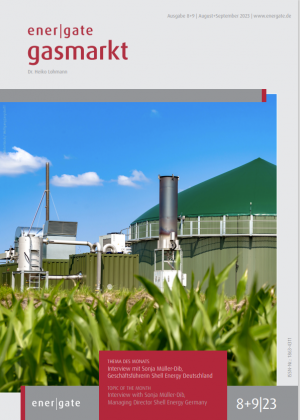Exactly five years ago I interviewed Cai-Delf Harms, then managing director of Shell Energy Deutschland (ener|gate Gasmarkt 08-09/18). Shell Energy Deutschland is one of the potentially large and powerful suppliers of natural gas to large industrial customers and public utilities. However, its market presence has always been, let's say, a little more modest than that of VNG, Uniper or WINGAS (SEFE). What fascinated me at the time was Shell Energy's clear goal of offering customers not only natural gas or electricity, but also decarbonisation solutions. The market has evolved. As a result of the gas crisis, i.e. first the reduction and then the far-reaching curtailment of Russian supplies, the focus has shifted towards security of supply. Cai-Delf Harms retired in 2021. Sonja Müller-Dib became managing director of Shell Energy Deutschland in February 2021. I talked to her about how Shell, as a very large LNG player, is responding to the crisis in Germany. But also whether and how the energy solutions for CO2 reduction have developed. What surprised me was the attention Shell is giving to biomethane as a solution.
ener|gate Gasmarkt: Ms Müller-Dib, Shell sold a total of 41.3 TWh of natural gas in Germany in 2021, almost 28 per cent less than in 2020. Earnings after tax were 1.2 million euros. Was the decline solely due to the Corona crisis, is your business weakening or was the strategy? How has the business developed since 2021?
Ms Müller-Dib: We are reluctant to comment on specific figures. But yes, the decline in sales in 2021 was due to the Corona crisis, and in 2022 sales did not increase either due to the politically desired restrictions on gas consumption.



